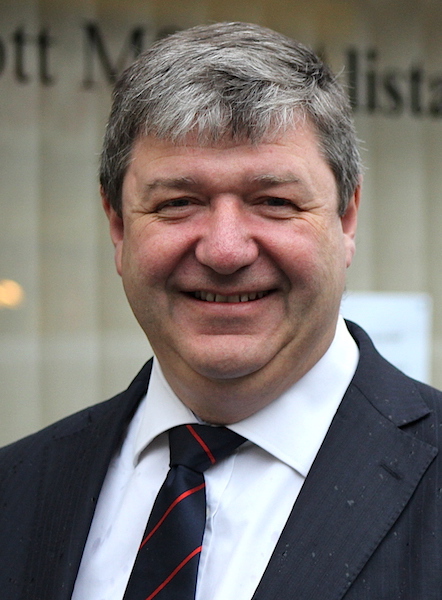News / Single market exit ‘deeply worrying’ for isles
LOCAL politicians have described Theresa May’s confirmation that the UK is to leave Europe’s single market as “deeply worrying” and warned it could present “enormous challenges” for the Shetland economy.
After months of uncertainty, in a speech on Tuesday the Prime Minister said she would not seek to retain membership of the single market as part of negotiations to leave the EU, which will commence when Article 50 is triggered in March.
SIC leader Gary Robinson, Northern Isles MP Alistair Carmichael and Shetland MSP Tavish Scott said they were worried by what that could mean for key isles industries such as seafood and agriculture, which export large volumes of fresh produce to EU nations.
Aith-based farmer Jim Nicolson of the NFU’s Shetland branch echoed those fears, though Shetland Fishermen’s Association spokesman Simon Collins said his industry remained “bullish” about its prospects.
Scotty Van der Tol, of the local Leave.EU campaign, said May was right to recognise the UK couldn’t remain in the single market or the customs union.
But Robinson said: “I think it’s deeply worrying for us here in Shetland and we might have more reason than others to be concerned about the direction this is taking.
“We’re clearly heavily reliant on the European market for a lot of fresh seafood exports, and I think there are no guarantees.”
He pointed out that Scotland, and the Highlands and Islands even more so, was a net beneficiary of European grants.
“It’s quite hard to judge what the long term impact is going to be, but I certainly don’t see many positives coming out of Brexit as Theresa May has set it out today.”
‘A dangerous step in respect of crofters and farmers’
Robinson said it was difficult to see how UK trade arrangements outwith the single market wouldn’t involve tariffs of some kind.
Become a member of Shetland News
May’s speech referenced low-tariff agreements through the World Trade Organisation (WTO), but the council leader said that organisation was “opposed to agricultural subsidies of the kind that Shetland has benefited from through its membership of the EU for many years”.
If it formed part of the answer “that’s really flawed and really is a dangerous step for us in respect of crofters and farmers”.
Nicolson said his personal view was that losing membership of the single market is “certainly going to make things extremely more difficult” for Shetland agriculture.
He “would not be optimistic” about the chances of obtaining a tariff-free deal and thinks it would be “fairly difficult to find alternative markets” – especially for the isles industry which faces additional production costs.
While emphasis is being placed on increasing productivity once some constraints imposed by the EU are removed, Nicolson said that “a large percentage of our costs are a result of the need to bring in feeding an the need to export our lambs from Shetland, and these are difficulties that are going to be quite hard to overcome.”
Robinson acknowledged fishermen were much more optimistic but said he felt there “isn’t a lot of substance, there’s a lot of bluster – this phrase about ‘fishing in a sea of opportunity’”.
“I think fishermen have as much to worry about as farmers do,” he told Shetland News.
In particular maintaining access to European markets to export seafood – which makes up around a third of the isles’ economy – is imperative.
“Europe is the biggest market for the fish we sell,” Robinson said. “It’s also the most lucrative as it’s the closest. If you start to look beyond Europe it’s either very expensive or you’re looking at frozen product, which demands a much reduced price.”
He added that European fishermen catching in UK waters pre-dated the Common Fisheries Policy (CFP) by centuries, with the Dutch catching in the 1600s under a rule of “land kenning” where “they could fish provided we couldn’t see them from the shore”.
Fishing industry remains ‘bullish’
Collins, however, said that “without being complacent, I think we’re actually quite bullish” because seafood is “not like a manufactured good” that is easily replaceable with alternatives.
Regarding the question of tariffs, he said that either way “we’re confident we’ll be able to sell through tariff systems as we do outwith the UK in any case”.
He said that if the UK was “not going to the EU with bended knee and not seeking favours”, it would be “less likely they’d give away access to our fishing grounds, which is our big worry”.
“You can make a piece of a car or an aircraft wing somewhere else, but you can’t get your monkfish and all the other stuff out there from other places. If there’s a small adjustment on price, I’m confident we’d be able to sell it.”
But Liberal Democrat parliamentarians Carmichael and Scott were both notably less sanguine about the prospects for fishing.
Scott said May had “raised the potential of Shetland’s fishing industry being a bargaining chip”.
“We know that Article 50 will be triggered by March, starting the negotiations that will take the UK out of the EU,” the MSP said. “What we don’t know is where fishing stands in the Prime Minister’s list of priorities.
“But she spoke about Spanish fishermen, not the Shetland or Scottish industry so I suspect it’s rather low down.
“The last thing the industry needs is to become a bargaining chip in Brexit negotiations. And it will [be] no use if we end up with a copy of the hated CFP.”
Industry giants will take priority
While he understood why the catching side of the industry saw opportunities, Carmichael said those would “only be as good as the political will of the government that’s delivering them”.
“There are some historic deals that will almost certainly still have to be honoured, and which it will be in our interest to honour. It comes down to sufficient political will in Westminster, which historically thought the fishing industry could be dispensable, to get the deal the fishing industry have been promised.”
While senior management with big oil firms, banks and car manufacturers have ready access to government ministers, the same doesn’t apply for fishermen or crofters, Carmichael pointed out.
He can foresee oil industry executives getting “specifically tailored exemptions” but the same deal for Eastern Europeans working in fish processing factories “seems a bit less likely”.
Speaking more generally, Carmichael said the Tory government “clearly still don’t have any understanding of the enormity of the task ahead of them, and while that is their problem, it becomes a problem for us all”.
Knowing May from his time in the Tory-Lib Dem coalition, he does not expect her to “change easily” from the position she has outlined, but hopes “they do listen to informed voices in the different sectors – manufacturing, exporting industries in particular”.
While he expects major economic players such as the finance industry to get priority, the “cumulative total of the smaller players is still massively important, and these voices have still got to be heard”.
After May relented and said the Westminster parliament would get the chance to sign off the terms of the Brexit deal, Carmichael described that as a “significant concession”.
“I would say, logically, that if there is to be approval given to the deal then that should be given by the people in a referendum, not by a vote in parliament,” he added.
‘There’s going to be some sort of horse-trading’
SIC development committee chairman Alastair Cooper said the impact on Shetland’s economy depended on securing “the best deal we can for our local fishing industry and aquaculture”, especially with a lot of whitefish – and to a lesser extent salmon – being shipped off to EU markets.
“I think we do have to recognise it’s going to be very difficult to police and invoke a deal that gives our fishermen exclusive rights to UK waters,” he said. “There’s going to be some sort of horse-trading that goes with it… then do we have the capability to police the UK waters… using our navy and Marine Scotland?”
Van der Tol, a spokesman for the local Leave.EU campaign, received May’s speech much more warmly.
“She is saying the right things and recognises that we cannot remain in the single market or customs union,” he said. “The fear is that the Liberal Democrats and Labour, who have no respect for democracy, will abuse their position to try and thwart or undermine either Brexit or the negotiation process.
“Tim Fallon and Jeremy Corbyn’s ‘little Europeaner’ rhetoric today have shown they and their parties are both still clueless to how democracy works and the meaning of self-governing as voted for in the referendum.
“Hopefully with both the USA and New Zealand this week publicly expressing great interest in pushing forwards with free trade deals people are beginning to glimpse what a global UK can look like.”
Become a member of Shetland News
Shetland News is asking its many readers to consider paying for membership to get additional features and services: -
- Remove non-local ads;
- Bookmark posts to read later;
- Exclusive curated weekly newsletter;
- Hide membership messages;
- Comments open for discussion.
If you appreciate what we do and feel strongly about impartial local journalism, then please become a member of Shetland News by either making a single payment, or setting up a monthly, quarterly or yearly subscription.
































































